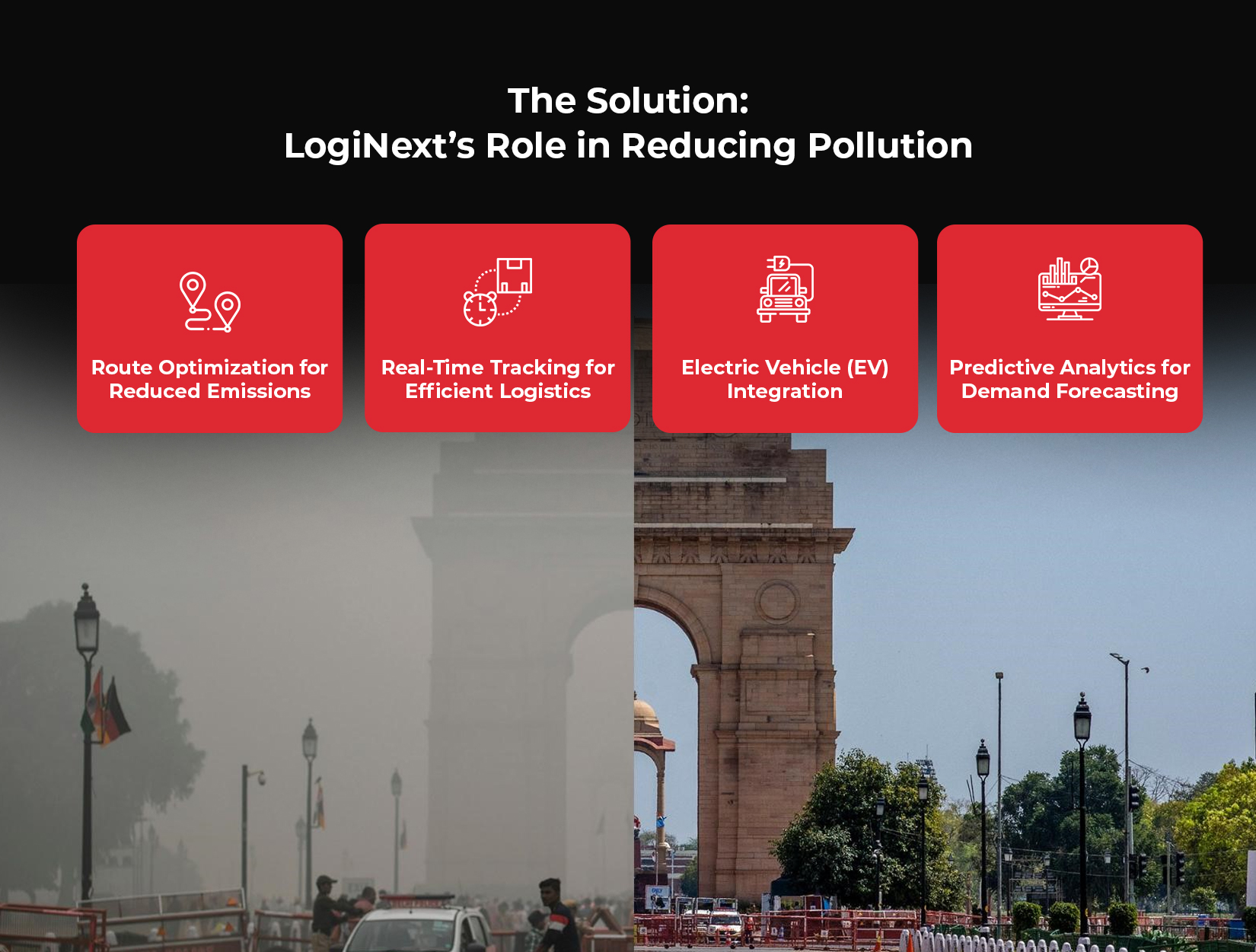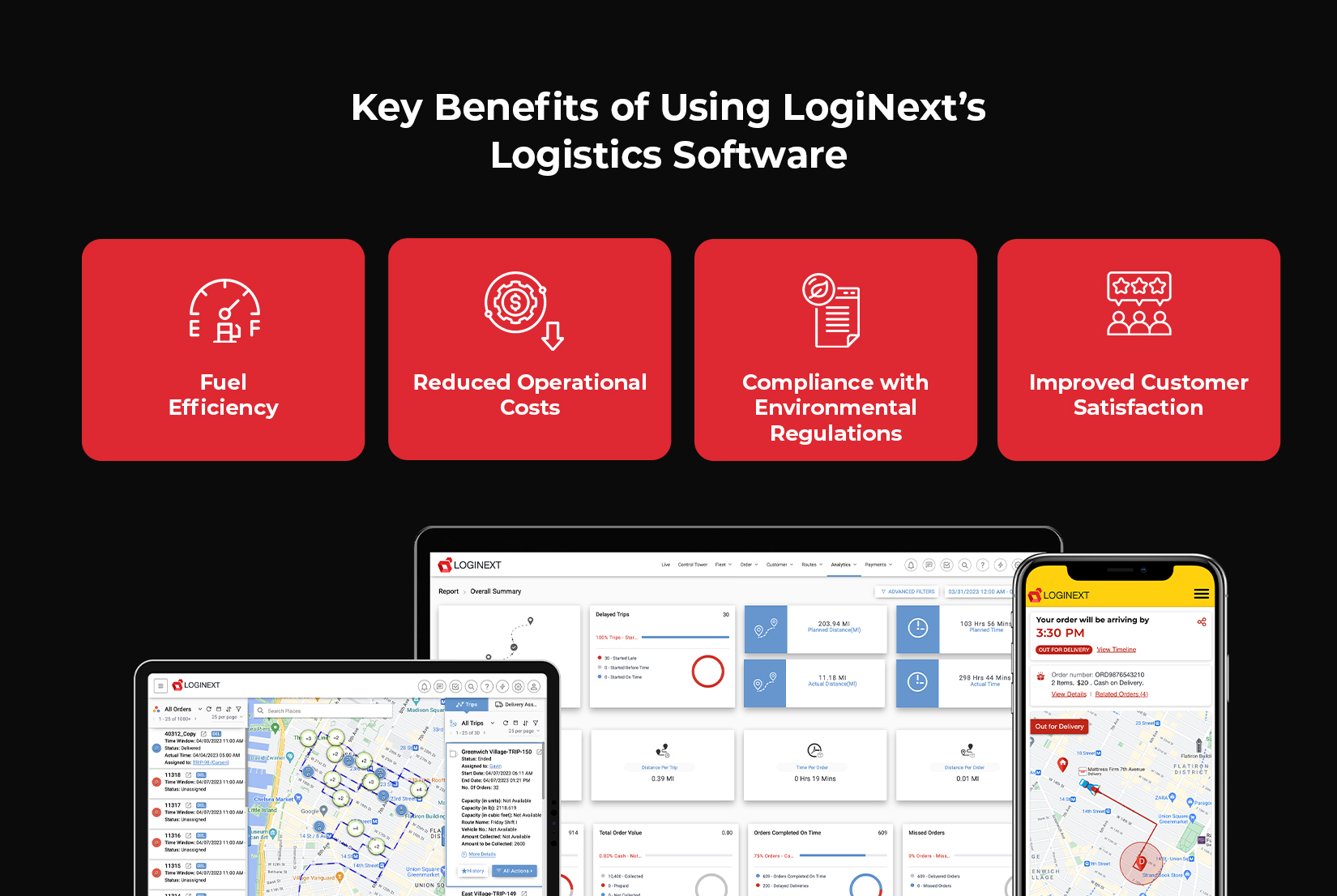
Delhi Pollution: How LogiNext’s Logistics Software Can Be a Game-Changer
Delhi, India’s capital, consistently ranks as one of the most polluted cities globally. Delhi’s AQ (Air Quality) is 304 which falls under the severe scale of the AQI (Air Quality Index). Vehicular emissions, accounting for nearly 40% of Delhi’s air pollution, are one of the most significant contributors. Within this, transportation and logistics activities play a key role due to the high fuel consumption, inefficient routing, and lack of sustainable practices. To combat this escalating crisis, adopting efficient and sustainable solutions is imperative, a logistics software is the right solution to go for.
Logistics software like LogiNext’s tools offers an innovative approach to minimizing environmental impact while improving operational efficiency. By leveraging advanced technology, the best logistics software can reduce emissions, optimize fuel usage, and pave the way for a cleaner, greener Delhi.
The Problem: How Logistics Contributes to Delhi’s Pollution
Delhi’s road transportation network is vast, with over 13 million vehicles registered as of 2022. Heavy-duty vehicles, such as trucks used for logistics, contribute disproportionately to emissions. Studies estimate that they emit 50-60% of particulate matter (PM) from vehicular sources. The inefficiencies in logistics, including poorly planned routes, excessive idling, and over-reliance on traditional systems, exacerbate this issue.
Moreover, the logistics sector’s reliance on fossil fuels adds to Delhi’s already deteriorating air quality. Reports suggest that for every kilometer traveled by a diesel-powered truck, nearly 2.7 kilograms of CO2 is emitted. With thousands of trips being made daily across Delhi, the environmental cost becomes staggering.
The Solution: LogiNext’s Role in Reducing Pollution

1. Route Optimization for Reduced Emissions:
LogiNext’s logistics software utilizes AI and machine learning to optimize delivery routes. By determining the most efficient paths, it reduces travel distances, fuel consumption, and time spent on the road. For example, a well-optimized route can cut fuel use by up to 20%, directly lowering CO2 and NOx emissions. This feature is crucial in densely populated urban areas like Delhi, where traffic congestion worsens air quality.
2. Real-Time Tracking for Efficient Logistics:
With a robust logistics management system, LogiNext enables businesses to track vehicles in real time. This transparency helps reduce idle times and ensure timely deliveries, avoiding unnecessary stops and detours. Studies indicate that minimizing idle time for delivery vehicles could reduce emissions by 10-15%.
3. Electric Vehicle (EV) Integration:
LogiNext’s logistics management software supports the integration of electric and hybrid vehicles into fleets. EVs are essential for reducing dependency on fossil fuels. Transitioning just 10% of logistics vehicles in Delhi to electric could potentially reduce equivalent to taking over 50,000 diesel- powered vehicles off the road annually.
4. Predictive Analytics for Demand Forecasting:
One of the unique features of LogiNext’s software is its predictive analytics capability. By forecasting demand accurately, businesses can consolidate shipments and reduce the number of trips required. This not only optimizes costs but also cuts emissions by 15-30% making it a win-win for both businesses and environment.
Key Benefits of Using LogiNext’s Logistics Software

Implementing advanced logistics software like LogiNext’s brings multifaceted benefits that extend beyond just operational efficiency. Let’s delve deeper into the four critical advantages:
1. Fuel Efficiency:
Optimized routing and real-time vehicle tracking reduce unnecessary travel and idling, leading to significant fuel savings. Businesses can achieve up to 20% lower fuel consumption, which directly cuts down on CO2 emissions while slashing fuel expenses.
2. Reduced Operational Costs:
Streamlining logistics processes through automation and predictive analytics minimizes redundancies, such as empty trips and overuse of resources. This efficiency translates to savings of up to 25% in operational expenses, making it a cost-effective solution for businesses.
3. Compliance with Environmental Regulations:
With stricter emission norms in Delhi, staying compliant is critical. LogiNext’s logistics management software ensures adherence by promoting sustainable practices like EV integration and reducing overall emissions, helping businesses avoid penalties and improve their green credentials.
4. Improved Customer Satisfaction:
Efficient logistics operations mean faster, more reliable deliveries. Coupled with the environmental impact of reduced emissions, this builds customer trust and loyalty. Companies using the best logistics software are often perceived as leaders in sustainability, enhancing their market reputation.
These benefits collectively contribute to both business growth and environmental conservation, making LogiNext’s solutions a crucial tool for the future of logistics in Delhi.
Real-World Success Stories
Businesses around the globe are experiencing remarkable transformations with the adoption of advanced logistics software. Cities like London and Singapore, which face challenges similar to Delhi in terms of urban pollution and traffic congestion, have seen significant progress. By leveraging logistics management systems, these cities have managed to reduce carbon emissions from urban deliveries by as much as 30%, setting an example for others to follow.
For instance, logistics operators in Singapore streamlined their last-mile delivery networks using predictive analytics and route optimization tools. Similarly, London’s logistics fleets incorporated electric vehicles into their operations, supported by advanced software for fleet and route management, cutting emissions drastically while maintaining delivery efficiency.
Delhi can replicate these success stories by encouraging its logistics operators to adopt solutions like LogiNext. By using the best logistics software, businesses can reduce emissions, improve operational efficiency, and achieve long-term sustainability while contributing to a cleaner and greener city.
Future Trends in Logistics for a Greener Delhi

The logistics industry is undergoing a technological revolution, paving the way for more sustainable operations. For a city like Delhi, grappling with severe pollution, adopting these trends is vital to reducing emissions and ensuring a greener future.
1. Adoption of EVs and Sustainable Fuels:
The transition to electric vehicles (EVs) is one of the most impactful shifts in logistics. EVs drastically reduce greenhouse gas emissions compared to traditional diesel-powered vehicles. Supported by LogiNext’s EV integration capabilities, logistics companies in Delhi can streamline their fleet transformation, improving efficiency while minimizing environmental harm. Additionally, sustainable fuels like biodiesel can be an interim solution for vehicles still relying on combustion engines
2. Smart Warehousing:
Efficient warehouse management systems play a crucial role in reducing logistics-related emissions. Strategically located warehouses, combined with optimized inventory management, reduce the frequency and distance of trips. This directly impacts fuel usage and traffic congestion, especially in a city like Delhi.
3. AI-Powered Delivery Drones:
Although still in its infancy, drones offer a promising solution to urban logistics. By bypassing congested roads, drones can deliver goods faster while eliminating vehicle emissions.
Conclusion
Delhi’s pollution crisis demands immediate and innovative solutions. While policies and regulations are essential, the role of technology cannot be understated. The logistics software offers a comprehensive approach to tackling the inefficiencies that contribute to pollution.
From route optimization and EV integration to real-time tracking and demand forecasting, the features of the best logistics software not only enhance business efficiency but also promote sustainability. As Delhi aspires for cleaner air, the logistics sector has a pivotal role to play in driving the change.
By adopting advanced logistics management systems like LogiNext’s, businesses can reduce emissions, meet environmental compliance, and contribute to making Delhi a healthier city to live in. Sustainable logistics isn’t just a necessity—it’s the future. Click on the red button below and book a demo with LogiNext for a greener present and future.
27







@LogiNext